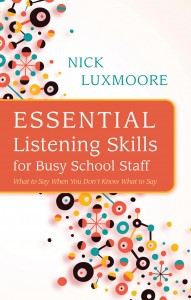Nick Luxmoore is a school counsellor, trainer, teacher, youth worker and UKCP registered Psychodrama psychotherapist. He has over 35 years’ experience of work with young people and with the professionals who support them. We caught up with him to talk about his work, his latest book: Essential Listening Skills for Busy School Staff, and his top tips on listening for teachers and other school staff.
You’ve worked with young people and with the professionals who support them for over 35 years. What do you enjoy most about your work?
I enjoy helping to build a culture, especially in a place like a school, where everyone feels appreciated and so feels able to appreciate others. I know that sounds extremely trite but I also know that it’s possible to do this in schools, making that tangible difference. Potentially, schools can be very therapeutic places.
I also enjoy the anger of young people. That might sound like an odd thing to say, but people only get angry because they care and I love the fact that young people care passionately about so many things that are unfair or, at least, seem to them to be unfair!
What’s the most challenging aspect of your work?
It’s difficult living with the fact that you can only do what you can do; that people will go away and make their mistakes. Some will thrive but others will have really tough lives. And there’s nothing more that you can do about it. It’s a lesson that every therapist has to learn and a lesson that everyone who works in a school has to learn as, year after year, they say goodbye to the people about whom they’ve really cared.
What inspired you to write ‘Essential Listening Skills for Busy School Staff’?
I used to be a teacher and, for years, I’ve been running all sorts of trainings for school staff. So I understand what it’s like to feel as if you’re never doing a good enough job, to feel that there’s never time to listen and to feel resentful of those people who seem to be getting all the attention and praise. This book comes out of all that experience and is informed by the questions people ask like, “This is all very well, Nick, but when are we supposed to find the time to do this listening? And what are we meant say to someone who’s depressed or cutting themselves?”
I’m passionate about this book because I think there’s a tendency in schools to refer children and young people on to someone else, often to someone from outside the school itself. People like counsellors and mental health professionals (keen to show how invaluable they are) sometimes give school staff the message that other people’s distress is far too disturbing and complicated for a mere member of staff to tackle. And nine times out of ten that’s just not true! Schools are about human beings supporting other human beings. A bit of guidance is always useful and my book provides that guidance for staff because most people want to talk to the person they know: not to some stranger they’ve never met before. I want staff in schools to feel able and confident to listen and support their fellow human beings, knowing that a little can be a lot and that you don’t need a professional qualification in how to be a supportive human being!
I also feel passionately that teachers aren’t the only people who listen in schools. In fact, it’s often non-teaching staff who find themselves besieged by needy people. So this book is as much for them as it is for the teachers. And it’s about listening, not only to children and young people, but to colleagues and parents. An upset member of staff is potentially just as disruptive as any upset student! And the extent to which we feel able to support other people will often depend on the extent to which we feel supported ourselves. So the quality of relationships in the staffroom matters just as much as in the classroom.
Can you think of an example where you’ve been able to help a student or colleague just through listening?
With students…. a baby develops a sense that it exists and is worth something because of the calm, interested attention that it gets from its parents and other people. So with young people it’s sometimes enough to listen and be interested. Our experiences of someone paying attention and finding us interesting are the building blocks on which everything else is built: our confidence, our self-belief, our sense of worth.
With colleagues…. I’ve listened to lots of colleagues who have ranted or wept buckets and there’s been nothing to say because life really can be that bad and sometimes it’s helpful when someone acknowledges this with us. People usually have good reasons to be ranting or weeping.
If you were going to give one tip to busy school staff to help them improve their listening skills, what would it be?
Listen to the feelings. Don’t worry about giving advice. Just listen to the feelings, especially the shittiest, angriest, saddest, most hopeless feelings. I’ll bet that the best listening experiences you ever had yourself were the ones when someone did just that for you. They didn’t patronise you. They didn’t offer you cheap advice. They just listened. And of course, when someone listens to our feelings expressed as words, we don’t have to enact those feelings!
You can find out more about Nick’s book here. You can also find more of Nick’s books on working with young people here.